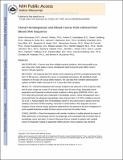Clonal Hematopoiesis and Blood-Cancer Risk Inferred from Blood DNA Sequence
Author(s)
Genovese, Giulio; Kahler, Anna K.; Handsaker, Robert E.; Lindberg, Johan; Rose, Samuel A.; Bakhoum, Samuel F.; Chambert, Kimberly; Mick, Eran; Neale, Benjamin M.; Fromer, Menachem; Purcell, Shaun M.; Svantesson, Oscar; Landen, Mikael; Hoglund, Martin; Lehmann, Soren; Gabriel, Stacey B.; Moran, Jennifer L.; Sullivan, Patrick F.; Sklar, Pamela; Gronberg, Henrik; Hultman, Christina M.; McCarroll, Steven A.; Lander, Eric Steven; ... Show more Show less
DownloadLander_Clonal hematopoiesis.pdf (1.273Mb)
OPEN_ACCESS_POLICY
Open Access Policy
Creative Commons Attribution-Noncommercial-Share Alike
Terms of use
Metadata
Show full item recordAbstract
Background
Cancers arise from multiple acquired mutations, which presumably occur over many years. Early stages in cancer development might be present years before cancers become clinically apparent.
Methods
We analyzed data from whole-exome sequencing of DNA in peripheral-blood cells from 12,380 persons, unselected for cancer or hematologic phenotypes. We identified somatic mutations on the basis of unusual allelic fractions. We used data from Swedish national patient registers to follow health outcomes for 2 to 7 years after DNA sampling.
Results
Clonal hematopoiesis with somatic mutations was observed in 10% of persons older than 65 years of age but in only 1% of those younger than 50 years of age. Detectable clonal expansions most frequently involved somatic mutations in three genes (DNMT3A, ASXL1, and TET2) that have previously been implicated in hematologic cancers. Clonal hematopoiesis was a strong risk factor for subsequent hematologic cancer (hazard ratio, 12.9; 95% confidence interval, 5.8 to 28.7). Approximately 42% of hematologic cancers in this cohort arose in persons who had clonality at the time of DNA sampling, more than 6 months before a first diagnosis of cancer. Analysis of bone marrow–biopsy specimens obtained from two patients at the time of diagnosis of acute myeloid leukemia revealed that their cancers arose from the earlier clones.
Conclusions
Clonal hematopoiesis with somatic mutations is readily detected by means of DNA sequencing, is increasingly common as people age, and is associated with increased risks of hematologic cancer and death. A subset of the genes that are mutated in patients with myeloid cancers is frequently mutated in apparently healthy persons; these mutations may represent characteristic early events in the development of hematologic cancers. (Funded by the National Human Genome Research Institute and others.)
Date issued
2014-11Department
Massachusetts Institute of Technology. Department of BiologyJournal
New England Journal of Medicine
Publisher
New England Journal of Medicine
Citation
Genovese, Giulio, Anna K. Kahler, Robert E. Handsaker, Johan Lindberg, Samuel A. Rose, Samuel F. Bakhoum, Kimberly Chambert, et al. “Clonal Hematopoiesis and Blood-Cancer Risk Inferred from Blood DNA Sequence.” N Engl J Med 371, no. 26 (December 25, 2014): 2477–2487.
Version: Author's final manuscript
ISSN
0028-4793
1533-4406